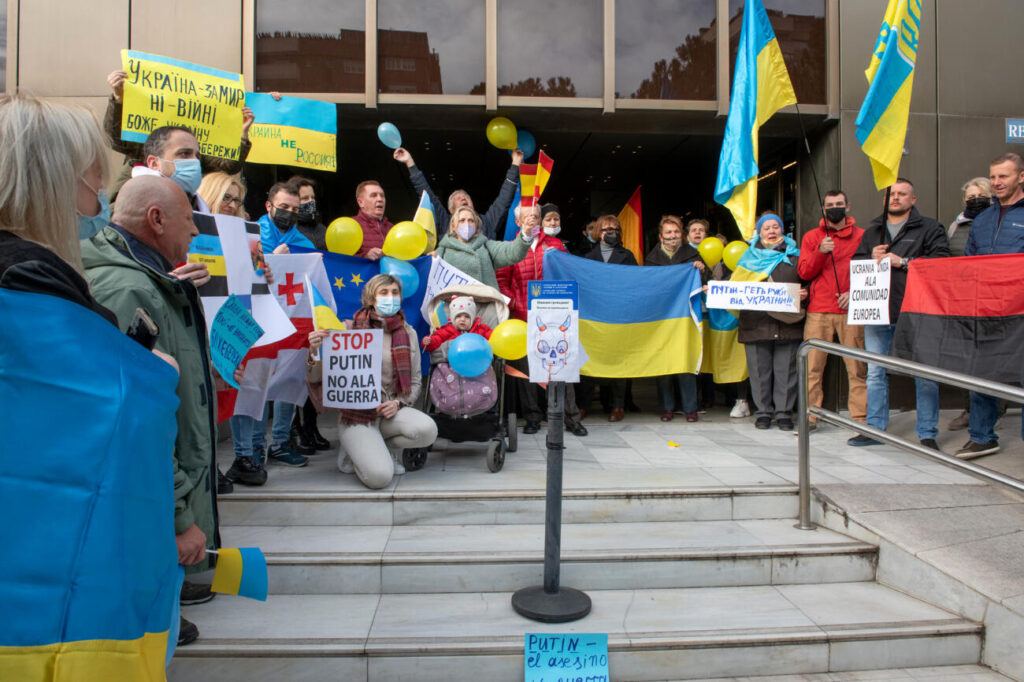24.02.2022 - 13:49
|
Actualització: 24.02.2022 - 14:49
Some 60 Ukrainians residing in Catalonia protested Russia’s invasion of their country on Thursday morning outside the Russian consulate in Barcelona. By 10 am a group of people had already gathered near the building in the Catalan capital’s wealthy Pedralbes neighborhood, waving Ukrainian flags and carrying signs condemning Vladimir Putin’s decision to send troops into Ukraine. The event began to quieten down at arounf 1pm.
They also sang traditional Ukrainian songs, as well as their national anthem, throughout the morning and called Russian president Vladimir Putin a “terrorist” and a “killer”. Some Russian nationals also attended the demonstration holding anti-war posters and chanting anti-Putin slogans. One of these was Nina Potapova, who said that a war in the 21st century was “crazy” and that there were “a lot of Russian people who don’t agree with [Putin’s] position, with his regime, and who are suffering also in Russia.”
Ukranians also gathered in front of their country’s consulate.
Worries and fears
Catalonia is home to around 14.000 Ukrainians and the increasing tension and hostilities between Russia and their native country are worrying them. Some have been living in Barcelona for over 20 years but still have family and friends in Ukraine. “I have not slept tonight,” Nadia Chernova, a Ukrainian national based in the Catalan capital told Catalan News. Part of her family is in Ukraine’s capital, Kyiv, but she has friends and family on both sides of the border. “I feel terrible,” she added.
Ivan Eytsar, a Ukrainian living in Barcelona for longer than 22 years, is also “worried” about the situation in his country. Despite his wife and sons being in Catalonia, his brothers remain back home. They live on the western side of Ukraine, closer to Europe, but Eytsar is worried for his land, for Ukraine, as he does not differentiate between the west or the south, he said to Catalan News.
Some of the Ukrainians Catalan News spoke to agree that their country has been in a tense situation “for eight years now.” Although, with the new developments, Nadia Chernova says she is now “scared.” In early 2014, the Russian Federation annexed the Ukrainian peninsula of Crimea. The annexation is part of the wider conflict between both Eastern European neighbors. “Ukraine is our land and we do not want to give it to Russian president Vladimir Putin,” head of the Ukrainians in Catalonia ‘Djerelo’ association, Olga Dzyuban, told this media outlet. “We want Russian troops to leave our country, to leave our home,” she added.
Fake news
For Barcelona’s Ukrainian consul Vorobyov Artem, the movement of troops by the Russian Federation has “violated our state sovereignty,” adding “it is a flagrant violation of international law.”.
With the arrival of the internet and the amount of news published by the minute, some of the Ukrainians living in Barcelona are concerned about the veracity of certain information related to the conflict between both nations. “There is a lot of information that is not true,” Dzyuban said, a feeling shared by compatriot Chernova as she claims that Russians “do not know anything about the conflict between their country and Ukraine,” adding “they all have the government’s opinion.”
She tends to read information from both sides of the border as she wants to know what is happening in her country. However, she does not read “official information from Putin’s government, as it is propaganda.”
International reaction
With the increase in tension seen in the past few days on the Ukrainian border, dozens of other nations’ governments have sounded the alarm. The Catalan president, Pere Aragonès, sided with Ukraine in a recent tweet, calling for “the respect of international law and to find a peaceful and democratic solution.” Ukrainian officials have several diplomatic missions in Spain, in cities such as Barcelona, Madrid, and Malaga. “We have received a lot of support and solidarity from authorities,” consul Artem said.
However, for Ukrainian Ivan Eytsar, previous European Union (EU) reactions to Russia’s threats “were not strong enough” as they only enforced sanctions that had no direct impact, especially because in recent calm periods, “people died on a daily basis.” “There have been 14.000 deaths” since 2014 Eytsar pointed out, adding that the country “is not that far, as it is only a four-hour flight.”
Despite being away, “we have Ukraine in our hearts and we suffer for our families,” Olga Dzyuban said. A common feeling shared by several residents here in Catalonia is that Ukrainians are strong and patient. “My family keeps going to work,” Nadia Chernova said, and she says she does not understand “how they can do it.” So far, there have been “no signals” that Ukrainians are “moving to Spain,” consul Artem said.


